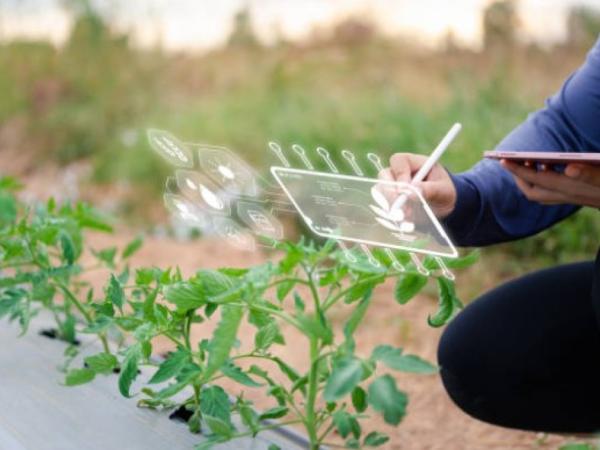The agrifoodtech ecosystem in Colombia is in a moment of significant transformation, driven by the country’s biodiversity, entrepreneurial talent and a growing culture of innovation.
(Read: ADR activates measures to prevent onion smuggling)
According to a report by Eatable Adventures, until 2024, The country has 163 startups dedicated to this area, with an ecosystem that shows a high geographic concentration in cities such as Bogotá, Medellín and Cali. These companies employ approximately 1,970 people and stand out for their focus on technological innovations applied to agriculture and food.
Colombia’s biological diversity is a key competitive advantage. Less than a third of its nutritional potential has been explored, opening up great opportunities to develop functional foods, nutraceutical ingredients and sustainable solutions. However, Only 30% of small producers use technology, a lower percentage than in neighboring countries such as Brazil and Chile, where this figure exceeds 50%.
(Read more: Nitrofert closes 2024 with more than 20% share of the agricultural inputs market)
According to the data, the agrifoodtech sector represented a market valued at at least $500 billion in 2022, and Projections establish that this will reach more than $730,000 million in 2028, representing an annual growth of 8.1%.
The Agrifoodtech ecosystem is characterized by a strong interaction between startups, corporations, universities and the Government. According to the Bogotá Chamber of Commerce, The adoption of technology and the use of tools such as big data and biotechnology are decisive to improve food security.
(See: Agriculture and coffee, the most abundant in terms of results this year)
Agrifoodtech
iStock
For her part, Andi highlights that Colombia has the potential to lead in the global market if it manages to take advantage of its agricultural frontier and strengthen its technological business models.. Universities also play a fundamental role in the development of the sector, promoting technology transfer and the creation of science-based startups. However, they face challenges such as the lack of acceleration mechanisms that allow their innovations to reach an adequate level of technological maturity.
(See more: Use of improved seeds mitigates risks of climate phenomena)
Based on the report, the segment of Agritech represents 35% of startups and covers solutions such as automation, traceability and regenerative agriculture. Then, there is the development of new foods aimed at innovative and sustainable products, representing 27% of the ecosystem.
Retail technology, which includes marketplaces and data analysis platforms, makes up 26% of the sector. Although the logistics and delivery segment has lost prominence after the pandemic, it still accounts for 10% of startups.
(Read also: First Committees of Congress approved agrarian jurisdiction: what the initiative seeks)
Also, Of the 22% of the startups founded in 2019 in the country, 32.5% correspond to applications and services to improve connectivity, 31.9% focuses on agriculture and crop production and 10.4% is on processed and packaged foods.
“With 163 agrifoodtech startups and 3 of the 5 most innovative companies from the food sector, Colombia is in a privileged position to lead the food technology sector and enhance its economic and social development”, they highlight.

Agrifoodtech
iStock
Investments
Looking towards the total investment of agrifoodtech in Colombia, This reached US$40.4 million, of which a significant portion came from initial roundsas pre-seed and seed, which represent 83.9% of the total.
(See more: Exports of non-mining goods grow 9.6% in the first 10 months of the year)
Therefore, it is important to note that throughout the region, Colombia has led investment in agrifoodtech, surpassing countries in attracting capital in that sector. “Excluding the case of Rappi, only Brazil would have attracted more investment in this area, consolidating itself as the second country in volume of investment in Agrifoodtech in the region“, they mention.
These figures reflect an ecosystem in early stages of development, but with great growth potential. Rappi, for example, has been a key player in the ecosystem, raising more than US$2 billion in investment rounds since its founding. Although this has mainly driven the delivery segment, areas such as Agritech and Foodtech are gaining relevance.
(Read: Corteva Agriscience launches new brand with sustainable agricultural solutions)
During this year 2024, startups such as Bacu and Home Burgers led the investment rounds with amounts of US$8.2 million and US$3.24 million, respectively. Additionally, although venture capital investment in Colombia is still in an early stage compared to other sectors, The food sector has raised nearly US$2.8 billion in recent years.

Agrifoodtech
iStock
Future of agrifoodtech
Now, the document mentions that looking towards the future, to strengthen the entrepreneurial ecosystem in the agrifoodtech sector of Colombia, It is essential to identify and address the specific needs of the country’s startups. For example, one of the priorities is to attract international specialized investors, who can provide capital, as well as experience to accelerate the growth of this type of company.
(See more: They confirm the first outbreak of highly pathogenic avian influenza in Colombia)
Likewise, the development of international programs in this sector is mentioned, the creation of specific incubation, acceleration and ‘scale up’ projects and also the simplification of access to public aid for the development of technology-based startups in Agrifoodtech.
However, important challenges still persist, as increasing the use of technology among small and medium-sized producers is crucial to improving competitiveness. Besides, It is necessary to strengthen programs that allow startups to expand into global markets. Most investments are concentrated in early stages, which limits the scaling of startups. Promoting synergies between corporations, universities and startups is key to developing sustainable technological solutions.
(Read: Regenerative agriculture, the opportunity to improve field productivity)
If the technological base is analyzed, only 42.3% of these companies have technology developed internally, Just as 27.3% of them have developed a technological program with an external company.
“The difference between the number of startups that patent their innovations and those that register their trademark indicates that many could be missing key opportunities to consolidate their competitive advantage and ensure stronger protection of their intellectual assets,” they conclude.
















